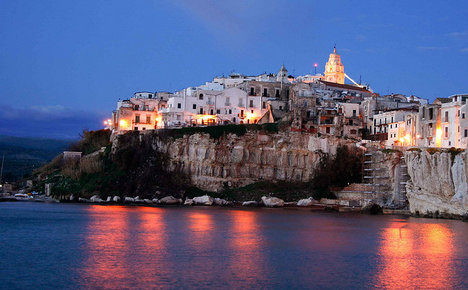Ten Italian lifestyle habits to adopt immediately
courtesy The Local IT Published: 02 Sep 2015 11:22 GMT+02:00
Go to the market more
Most small towns in Italy have a market at least once or twice a week, while in the larger cities you can find a market on almost any day of the week. But why make a trip to the market part of your weekly routine?
Apart from the fact that most markets offer everything you could wish for, they also get you outdoors and plunge you into natural light. The world feels like a better place when you’re not under the fluorescent glow of a supermarket bulb.
The market can save you money too – you can buy the exact quantity of whatever item you need and even haggle over the price if you feel like it.
Eat more fresh fruit and vegetables
This is kind of an obvious one when you do your shopping at the market. For sure, Italy is great when it comes to fresh fruit and vegetables as it offers fantastic produce all year round and lets you keep your diet interesting by eating seasonally.
The country has also managed to turn many a tomato-hater into a tomato-lover. Who can resist all that flavour?
A diet based on fresh seasonal fruit and vegetables is normal in Italy and being a locavore isn’t trendy or hip, it’s just the norm in a country famed for its food.
Interact with your local shop keeper
In Italy it is not uncommon to go to several different shops on one shopping trip, which allows you to develop a relationship with the people you are buying your stuff from. The upshots of this are numerous.
Firstly, your shopping trip becomes an opportunity to socialize. Why not catch up on the local gossip with your baker?
Secondly, knowing your local shopkeepers makes life easier. Bought a dodgy product? Just swap it, no lengthy wait at the customer service desk. Strapped for cash? Pay next time! At the end of the day, we’re all friends here.
A diet based on fresh seasonal fruit and vegetables is normal in Italy and being a locavore isn’t trendy or hip, it’s just the norm in a country famed for its food.
Eating together
Not that people don’t eat together in other countries, but in Italy preparing and sharing food together happens all the time.
The biggest difference is that dinner in Italy is not only offered via a formal invite – it often happens spontaneously. Make yourself at home!
Drink less alcohol
Italians do drink – even to excess. But what most Italians consider “excess” is what some people from other cultures might consider “just warming up”.
At the beginning, changing drinking habits can lead to pacing problems when you go out with your friends – but eventually drinking less is kind of a relief. The night lasts longer, you have more money in your pocket and you cringe less as you recall the previous night’s antics.
When you drink is important too – Italians tend to drink with meals or in the evenings. Liquid lunches and post-work pints soon slip by the wayside. Thank goodness for that.
Gesticulate
It is estimated that there are around 250 gestures that are commonly used by Italians. Some sociologists have pondered that they may have emerged as a way for Italians to communicate secretly in times when they lived under foreign domination. Others suggest that gesticulating emerged as a way of competing for attention in the crowded squares of Renaissance Italy.
One thing is for sure – the longer you live in Italy the more likely you are to throw your hands into the air when making a point. And why not?
While it may seem strange to drill your finger into your cheek after eating something good, gesticulating is a great way to display, and add subtle inflections to, the pleasures and dramas of everyday life.
Be more tactile
Italians are very touch-feely and at first it can be a bit strange, but it’s definitely a really positive aspect of how Italians socialize.
If it’s your birthday expect a hug and a kiss from everyone around and don’t offend by getting embarrassed about it. When you’re with Italian friends expect them to put their hands on your shoulder, ruffle your hair and stroke you, just don’t forget to reciprocate!
Science suggests that being a bit more touchy-feely could make you happier, as physical contact with other humans produces oxytocin, a feel-good hormone that is central to intimacy and bonding.

Develop a sense of local pride
Many Italians from small towns will tell you exactly why their hometown is the most beautiful place in the world and why you should visit. They will passionately talk about the great local restaurant or local spot where everybody goes.
Back in the UK at least, local pride is almost looked down upon – and many people from small towns are embarrassed about where they have their roots. Very often people just lie and tell you that they are from their nearest large city.
Going out and about
When Italians go out they tend to move around a lot. They don’t just head to the nearest watering hole with their friends – they actively hit many venues over the course of the evening.
While the endless debate about where to go next can get tiresome, an Italian night out is great for socializing because it brings you into contact with many more people.
It also favours the group dynamic as your itinerary will tend to take you to places that different people in your group like: introverts who like quiet bars and extroverts who love crowded clubs all get a fair kick of the ball.

Italianize your coffee habits
Generally speaking, having a coffee is a small, quick affair in Italy. You drink it standing up at the bar. Coffee culture elsewhere tends to involve long, lingering sips, where you sit down for as long as you like and get endless refills.
Each to their own, we say. However, if Italy has taught us anything at all, it’s that you should NEVER drink a cappuccino after your afternoon or evening meal. Nobody is sure why but it’s a no-no. It just is.
Italy, Territory of Taste
Italy has always been a synonym for “good food,” offering an unmistakable explosion of flavors, scents, and aromas. Aside from having one of the most famous cuisines in the world, it also proposes an immense variety of different regional dishes and recipes.
Visitors cannot miss the culinary and wine itineraries – journeys through Italy’s enogastronomic culture, in search of ancient recipes, genuine products, and simple food inspired by classic Italian cooking and innovative creations. World-renowned products such as Parmigiano Reggiano (Parmesan) cheese, Parma and San Daniele ham, Modena balsamic vinegar, Genoa’s pesto, buffalo mozzarella from Campania, Alba truffles, and cured meats are just some of the symbols that make Italy the land of good food. And how could anyone forget pasta and pizza, universal synonyms for Italy?
Italy’s wines, those noble ambassadors of Italian excellence throughout the world, must not be neglected. The pleasure of tasting a fine wine in its native environment is unparalled – a glass of Chianti or Brunello di Montalcino in Tuscany, of Barbera or Barolo from Piedmont, of Prosecco di Valdobbiadene in Veneto, of Lambrusco from Emilia Romagna, or the Sicilian wines or the white wines in Friuli and Trentino-Alto Adige, or the great reds of the Valtellina, just to provide a fine few exemplars. Italy is a world of tastes that tempt the palate , eyes, and heart!
Italian Wines
The Ancient Greeks used to call Italy “Enotria,” in reference to its production of extraordinary wines. It would be impossible to list all the features of Italian wines, sought after the world over for their variety and their quality.
